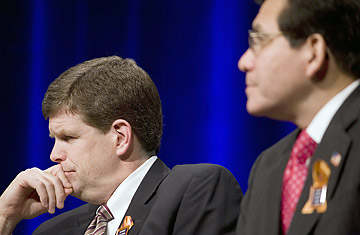
U.S. Deputy Attorney General Paul McNulty, left, and Attorney General Alberto Gonzales
As is so often the case when someone gets the ax in Washington, the official explanation for McNulty's departure was personal. In his one-page letter to Attorney General Alberto Gonzales, the deputy AG wrote that he will be leaving in late summer because of the "financial realities" of trying to provide for college-age children on a government salary. McNulty, 49, has worked nearly half his life either on Capitol Hill or in the executive branch.
But no one is taking that to be the real reason. Since McNulty's congressional testimony in February that the White House was involved in the firing of at least one of the nine U.S. attorneys who were forced to resign last year, the tension between his office and Gonzales's has divided and crippled the department. "There's a war going on between the DAG's office and the AG's office," says one senior Justice official."The thing that's 100% clear is that there's really no leadership. Both the DAG and the AG are so compromised, there's no one running the department. There's a lot of antagonism between those two groups. The DAG is throwing [Gonzales and his team] under the bus."
The Administration had hoped that McNulty's testimony before the Senate Judiciary Committee would tamp down what it then considered a minor controversy. Instead, it helped fuel it into a major one. Subsequent accounts and documents released by the Administration confirmed that the White House had been involved in the dismissals, and far more extensively than McNulty indicated. Meanwhile, his contention that most of the firings had been "performance related" outraged many of the dismissed U.S. attorneys, who had been silent until then. It turned out most had been good performers. McNulty has since blamed the discrepancy on inadequate briefing by Gonzales's then Chief of Staff Kyle Sampson and Monica Goodling, who was the Department's White House liaison. Both have resigned amid the spreading scandal.
Key officials, including Goodling — who pleaded Fifth Amendment protection against self-incrimination, but has since been granted immunity — are expected to be called in front of the House and Senate judiciary committees in coming weeks. There is some speculation that, with McNulty's pending departure, they will attempt to shift more of the blame for the debacle onto him, saying that he was more involved in the decision-making surrounding the firing of the U.S. attorneys than he has thus far let on. In fact, the shifting has already begun. "You have to remember, at the end of the day, the recommendations reflected the views of the deputy attorney general. He signed off on the names," Gonzales told reporters at a National Press Club forum the morning after McNulty announced his resignation. "And he would know better than anyone else, anyone in this room, anyone — again, the deputy attorney general would know best about the qualifications and the experiences of the United States attorneys community, and he signed off on the names." McNulty may feel the need to address the issue again, to clear up the question of precisely why the prosecutors were dismissed. The darkest theories are that their removal was designed to affect the prosecution of specific cases — particularly ones that might have affected the outcomes of close electoral contests. McNulty would be in a position to testify as to how much political pressure, if any, the White House was putting on DOJ.
Congressional investigators say they intend to press on with their demands for additional testimony from Administration officials, including the President's top political adviser, Karl Rove. Lawmakers have also said they will not confirm any more Justice Department nominees until they are given e-mails and other documentation they have demanded from the White House.
Whatever happens, McNulty's resignation leaves congressional leaders far from satisfied. "It seems ironic that Paul McNulty, who at least tried to level with the committee, goes, while Gonzales, who stonewalled the committee, is still in charge," said Senator Charles Schumer, a member of the Judiciary Committee and one of the loudest voices in Congress demanding Gonzales's resignation. "This Administration owes us a lot better."
